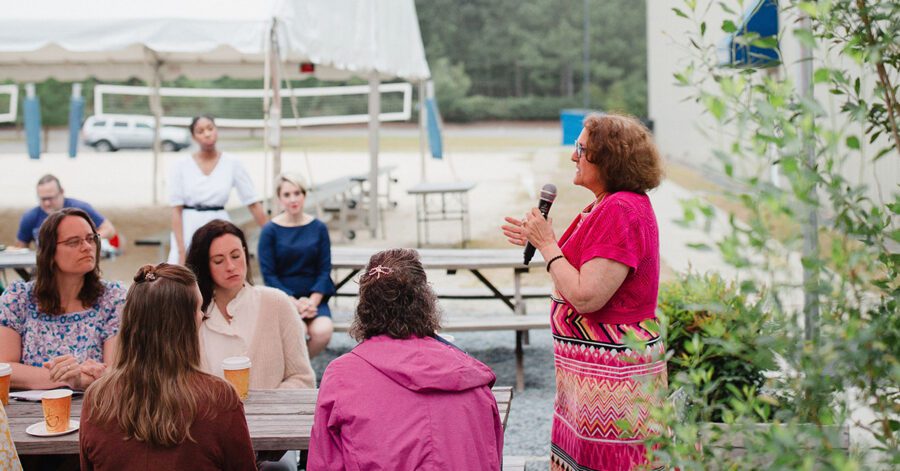By Leigh Bortins Only
The Battle for Home Education
I’m Leigh Bortins, founder and visionary of Classical Conversations. Since my family started homeschooling, I have worked to re-humanize education from the dehumanizing effects of technology.
As we face the rapid rise of artificial intelligence in education, I believe it’s important to share the journey that has shaped my convictions on humanity’s interaction with technology in this information age.
A Legacy of Defending Homeschool Freedom
In 1984, I worked with Washington state homeschool organizations, including Dr. Michael Farris’s Home School Legal Defense Association (HSLDA), which originated in Washington, when our family lived there. When we moved to North Carolina, I worked with NC Senator Ham Horton, who helped parents lobby state legislators to remove compulsory education laws that impeded parents who wanted to resume the proper authority in the family.
I helped lead our county’s homeschool organization to develop not only a private homeschool sports league but also co-ops and field trips. Through the local homeschool organizations, along with HSLDA, I was able to help families whose children were put in foster care and whose parents were jailed or fined for homeschooling. It’s very scary when a woman in a suit shows up at your door with a police officer. The compulsory model of government schools does not expect parents to lead their families.
Embracing Face-to-Face Educational Learning
The government funds a factory model that fails to develop children appropriately, treating them like machines to be optimized for efficiency. Educating children inherently requires ‘wasted’ resources. Learning more closely follows a sine curve. It’s not linear. And no child can learn just because the boss (teacher) has a quota. Factories do all they can to eliminate waste and disorder under the constant threat of punishment for missed quotas (test scores).
I have also fought the use of online education for children. Did you know that insurance cost reduction is a major reason for online education? Working face-to-face with children is apparently dangerous. But the Scriptures tell us that a student will be like their teacher, and I don’t believe that children are plastic boxes that house wires and motherboards.
I encourage Classical Conversations parents to use a minimal amount of online education with their children. As convenient as online education can be for adults, it conditions all of us to ignore the incarnate. Our children have five senses and bodies that move. Online education only trains two senses, sight and hearing, and doesn’t foster appropriate activity, hence one reason for our obesity crisis. We need to taste and see that the Lord is good, not snack in front of a video course.
What does Stick in the Sand Mean?
Protecting Parental Authority from Government Overreach
As my son, Robert, joined CC as the CEO, we have spent much time and money fighting lawfare that dehumanizes parents. These legal battles are against laws that seek to limit the gig economy, inherently limit opportunities for part-time income, a major source of financial support for parents juggling busy families. These economic restrictions also limit the independence of the entrepreneur and stifle the natural energy and innovation of families.
We have been fined, but have fought and always won, in county and state investigations into CC operations. And of course, we incurred a considerable legal expense because my family helps people homeschool in Russia. We were subpoenaed by the FBI investigating our role in Russian collusion. Isn’t it amazing to think that this family, who just wants to help fathers and mothers return to their natural roles as educational leaders, has had the privilege to stand against so much prosecution as we keep Satan from persecuting the family.
This is why we continue to fight against any form of federal, state, or local government manipulation of fiat dollars, tax credits, and regulations in the name of social engineering. We all know the damage welfare has done to the family. We know the damage government grants have done to private, Christian colleges shackled to ‘woke’ hiring standards because they were motivated by financial incentives.
The Hidden Cost of Government Funding
Somehow, many conservatives ignore the parallels in K-12 education as they bribe parents for votes. Even if government dollars spent on education were proven to be very effective, I would still be against it because it would train my husband and me to maintain the illusion that the government can educate our children to know God and to make Him known. By taking the funds, we would have to comply with the government’s standards.
Of course, public education has declined because it is funded by the wrong source. If I expect the government to provide for my children, what is my husband’s role? The government is usurping his God-given responsibility. That responsibility is natural and right, not something to be avoided or offloaded onto the government.
Homeschool vs. Public School
Facing the Next Frontier: Artificial Intelligence and Education
I hope this history of our family’s battles demonstrates the breadth of challenges we have overcome in our desire to educate our children at home and with humans. I hope it inspires trust so I can recruit you as we battle the new ways AI will dehumanize the family’s most important role – teaching their children.
Each year, over 50,000 Classical Conversations families consider how the classical conversations of history affect their children’s views on culture, faith, technology, and more. I am interested in AI because, as the founder of Classical Conversations, I am responsible for curating curriculum for families across the globe. AI is rapidly changing the educational environment.
Leading Through Change
My degree in Aerospace Engineering from the University of Michigan (1983), my launch of The Math Map – a K-12 Classical math curriculum (2024), and my pursuit of the sciences through the Quadrivium provide the foundation for my lifelong interest in new technologies.
As an early blockchain student and Bitcoin adopter, I started a bi-monthly luncheon to discuss decentralized finance among local business leaders, and of course, CC has a percentage of Bitcoin in our corporate treasury.
Every month, I lead eight hours of online conversations with business leaders to discuss AI’s effect on education. I am researching the impact of AI on the broader educational landscape with my son, Robert, and Classical Conversations’ IT department of 20 employees trains our 150 employees and 1000s of contractors to use AI well. Our work in education, business, politics, legislation, and science has prepared us to consider AI’s philosophical and practical consequences on tutors, parents, and children.
Christians at the AI Frontier
Artificial Intelligence (AI) Defined
AI stands for artificial intelligence. AI systems are programmed to sound competent and conversational, which makes them just seem to be intelligent, hence the word artificial. The word ‘intelligence’ comes from its ability to gather, analyze, and summarize far more information far more quickly than ever.
The AI era exists because of a series of technological advancements converging at the same time. 5G, blockchain, computing power, efficient electricity, and abundant energy all have converged in time and space to support AI.
4 Types of Artificial Intelligence
Even though it can do much more, general artificial intelligence (AI) is used much like a glorified Google search. General AI is trained by scraping the general information on the internet. Large language models like ChatGPT, Claude, CO-pilot, and thousands more scrape the internet based on specific algorithms in order to do a better job than previous search engines.
Narrow AI (NAI) is currently the most useful form of AI and has the most success. NAIs are trained by very specific, often professionally verified, and commonly used information. Narrow AI is making extraordinary advances in medicine, law, and navigation because the training content is highly vetted by people who want to use narrow AI. These experts already have good questions to ask AI and can be less fooled if an error is made.
Artificial General Intelligence (AGI) is the most controversial because advocates claim it will be as general as current AI, with the expertise of narrow AI. This is where the controversies lie—will AGI become so advanced that it can gain consciousness and take over mankind? Note that the general use of AI is not the same as Artificial General Intelligence. And the technologies that support AI are not quite ready to become AGI, let alone Super Artificial intelligence (SAI), where robots and humans will merge.
Should Students Use AI for Education?
Both general AI and NAI do something new – they can not only help you write better queries and more quickly research, but they can also summarize the research for you. Previously, educators rightly worried about academic laziness by using encyclopedias, textbooks, and Wikipedia rather than original source documents and verified authors. At least with these tools, the student had to produce their own artifact. With AI, the student doesn’t have to work at all to produce a written or illustrated work. This is why I believe AI is not just another tool; it’s a new paradigm.
Questions about AI’s Effects on Humans
Thoreau was wrong when he said, “The mass of men lead lives of quiet desperation.” I believe the mass of men are led to lives of quiet desperation.
It’s my responsibility as a Christian to lead others to a holy life inspired by God. I believe the parents who have worked hard to recover classical education have the wisdom to be inspired rather than made desperate by new technologies. Classically minded families have been pursuing truth, goodness, and beauty for decades. We are equipped to ask questions and to be ready with an answer for our hope, even as AI diminishes our neighbors’ ability to think.
Applying Classical Learning to New AI Technology
If I had lifted the garage door on Bill Gates in 1975 as he developed DOS (Disk Operating System), I would not have known what to do with his invention and would have had no idea of the implications of personal computers. Now, as I lift the door on AI, blockchain, Bitcoin, Web 3, Nvidia, peer-to-peer energy trading, and more, I am without excuse.
Fifty years of classical studies have taught me to ask questions while researching innovations and praying over their theological ramifications. I want to think deeply and discuss the impacts of AI and new technology with other parents.
Open Questions on the Future and Use of AI in Our Culture
1. Practical Impacts of AI on Daily Life and Education
- How will AI create significant problems?
- How will AI solve significant problems?
- How is AI contributing to the loss of intellectual property rights?
- How will parents embrace their natural responsibilities when robots become integrated into the home?
- What boundaries will be established when robots are funnier than dad, teach math better than mom, pick up the toy dropped from the toddler’s highchair over and over, play games with brother, and discuss books with sister anytime and anywhere we ask without complaint, while offering to get us an iced tea?
- What will Christian educators do when a 13-year-old is dropped off at school by Waymo (autonomous driving vehicle) with his educational assistant robot because the child’s parents want it trained by the educator?
- How will your human-based programs compete when parents think that is normal?
- What will happen when you schedule an interview with a potential new teacher, and they send their administrative AI assistant?
- How will we assess students?
- It is possible to memorize the main parts of a text or piece of literature, but what will be expected when the entire large language model is the curriculum?
- How do China’s social credits differ from school transcripts or KPIs (key performance indicators)?
2. Questions of Human Skill and Development
- What natural inclinations, like navigation, will become underdeveloped?
- Should we compare human abilities to a faster car or a better runner?
- Do we want to raise children who are only outliners, creators, editors, or presenters, or should they be adept at all parts of the thinking process?
- Do we want to raise children who value convenience and instant gratification over work and wrestling with an issue?
- Can we tell the difference between tools that are appropriately efficient for competent employees but inappropriate for students?
3. Relationships and Social Dynamics in an AI World
- Who will be our children’s companions? Our companions?
- I already find myself talking to my car, my robot vacuum, and my robot mower. How many of you are trained to talk to Alexa?
- How many of our children esteem the cell phone over their siblings?
- How many of us diminish our humanity by being on the cell phone when people are in the room? And cell phones don’t even do laundry!
4. Knowledge, Information, and Intellectual Formation
- What’s the difference between knowledge, data, and information?
- Who is the authority behind an AI response?
- Will our children know about authors? Will they fall in love with people who help us think?
- Will our children know that machines summarize average, aggregated, and sometimes accurate information (my name for AI), but only humans can be unaverage?
5. Existential, Theological, and Philosophical Concerns
- Will something that is no more human than a toaster be allowed to run our lives? Will we blindly follow the robot like we do the GPS?
- How will we respond to people who embrace the Singularity: the expectation that, since all of creation is just energy, humans and robots will become one?
- How will we share the hope of Jesus Christ to those who believe death is a physical condition that man can overcome?
- Do we believe C.S. Lewis is correct, and that the hideous strength of some men having power over all men will lead to the abolition of man?
- What power will you hold over AI?
- What power will AI hold over you?
The Classical Conversations Approach to AI and Classical Education
Because of these questions and our responsibility to constantly remind people that God became a man, the Classical Conversations tagline on our catalog of “Homeschool with a Friend” will be changing to “Homeschool with Humans.” While AI is here to stay and cannot be ignored, relationships with other humans made in the image of God nurture and nourish our souls in ways that no computer or program can ever do.
In Part Two of this article, I will let AI describe CC’s philosophy on using AI in the Parent-Tutor-Student relationship.
In Part Three, I will return with my advice on how to use AI appropriately within the parent-tutor-student relationship.
Learn even more about AI and education from Leigh’s discussion at Judson College:





